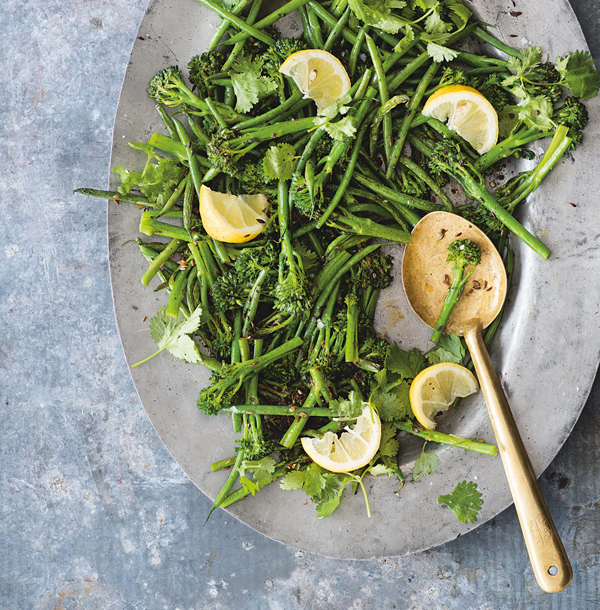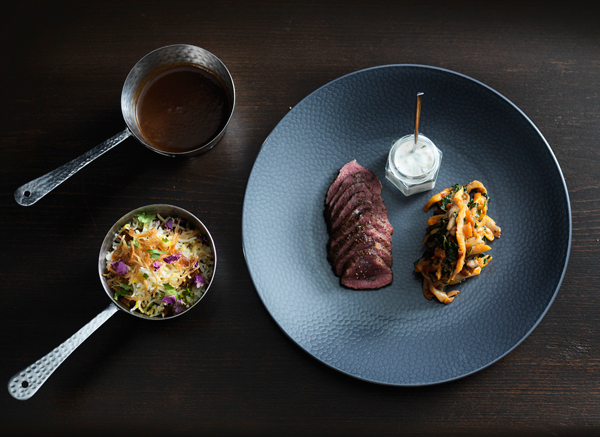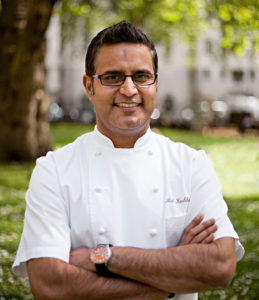The spice of life: new Indian cuisine for caterers
Chefs and foodservice suppliers are upping their game to stay ahead of the competition in the spice race, as Richard McComb reports
It has been dubbed the chicken tikka masala meltdown, with the quintessentially British dish coming under fire as representing everything unpalatable about Indian food. The creamy concoction has become a culinary whipping boy, condemned as symptomatic of a bland and unhealthy meat-based cuisine.
Difficulties sourcing skilled labour from India have added to the sector's woes.
Far from it. Necessity has become the mother of reinvention, generating a new wave of Indian dining. Recipe innovation, smaller plates, lighter bites and plant-based menus are giving bhunas the boot.
Research suggests that the death of Indian dining has been greatly exaggerated. Market intelligence agency Mintel's report on restaurants and takeaways earlier this year revealed that 20% of UK consumers had eaten Indian/Bangladeshi food in the previous three months, while 22% had ordered it as a takeaway. And an April 2018 Mintel report hailed the growth of plant-based Indian street food while warning caterers to ignore popular trends such as vegetarianism and veganism at their peril.
Street food revolution
The new accent is on lightness, freshness and vibrancy. Michelin-starred chef Atul Kochhar of London's Benares says: "Street food has shown no signs of slowing down in 2018, and Indian street food is no different. Our street food menu was designed to meet this increase in demand for smaller, sharing-style dishes, while maintaining our Michelin-star standard."
Dishes include tandoori cafreal sea bass with spiced tomato chutney from Goa and grilled chicken seekh kebab with piquillo pepper ketchup from Lucknow. Diners are encouraged to eat with their fingers, as they would at a street shack.
Indian food writer Mallika Basu says: "People have become a lot more open to exotic tastes, techniques and more unusual mealtime moments when it comes to Indian food.
meric, for instance, has gone from a spice nestled in curries to a key ingredient, thereby opening the floodgates to more exotic spices that come with health benefits. The same goes for coconut oil. And it's not just ingredients. The interest in fermenting and the trend of brunches have brought Indian fermented snacks, as well as the nation's breakfasts, very much into the limelight."
Dosas made of a fermented lentil and parboiled rice batter lead the way for breakfast and brunch. Basu's treats include Badami gobi musallam - whole roasted cauliflower covered in an almond and cashew cream sauce, with a vibrant green saag paneer made with black kale, leafy greens and Swiss chard.
A blast from the past
In Birmingham, chef Aktar Islam has delivered a fresh, light take on dishes created by grand chefs in the 13th century, infused with influences from China, Persia, Arabia and Afghanistan. Inspired by the classic Nimatnama text of the sultans of Mandu, Islam reinterprets tradition to deliver a unique combination of flavour pairings at the new 70-cover Opheem.
Islam says: "I want Opheem to capture the sense of adventure that saw these chefs introduce pioneering flavour and texture combinations. The inclusion of European foods, such as chillies, potatoes, tomatoes and sour vinegars in Indian dishes we know and love today can be traced back to these chefs."
A dish of Akbari dopiaza exemplifies Islam's approach, experimenting not only with flavours but methods. The chef says: "We take the poussin and brine it overnight. We confit the legs in chicken fat and aromatics. The breasts are taken off the crown, glued together, wrapped with skin, and then sous vide-finished in curried beurre noisette.
"Dopiaza is a dish where the sauce is made from two different preparation of onions. We've taken this to new heights by selecting different onions for their flavour and texture and cooking them by various methods."
Crazy combinations
Vishnu Natarajan, executive chef at Chokhi Dhani in London, believes diners have become far more daring in their menu choices. He serves a hemp seed-based 'cannabis' chutney with a pulled rabbit dish. "Brits are turning away from cream-loaded curries and becoming really adventurous," he says.
"Small plates are livening up an otherwise dull Indian lunch. Upscale dining is another level of challenge, working out how to creatively lift the bursting flavours and vibrant colours of Indian cuisine while adopting other ingredients so it doesn't get lost in modernisation."
mples include a novel take on foie gras. The duck liver is marinated with a reduction of tamarind, red chillies, ginger, garlic and spices for 24 hours, then cooked in a charcoal tandoor for a smoky flavour. The liver is presented over pumpkin poriyal, a chilli and cumin balsamic reduction and a cassava crisp.
Natarajan adds: "2019 should see dairy-free, millet-based ice-cream come into the mainstream. I can see lotus root, wild mustard and mango-flavoured ginger, as well as chemical-free ingredients."
The trend towards marrying European and Indian ingredients can also be seen at the Viceroy in Milford, Stafford, where head chef Ain Ullah believes Indian operators need to catch up with the pace of culinary evolution.
Ullah says: "The presentation of the dishes has changed, introducing a delicacy that once wasn't there. We have found our menus and dishes had to change with the growing demands for healthy diets."
The chef has started using Spanish spices, including smoked paprika and saffron as well as ingredients not typically associated with Indian food, such as beetroot for a chutney served with roasted lamb chops.
A world of difference
Changing perceptions about Indian food presents opportunities for workplace caterers, according to Jacqui Mee, director of food at Olive Catering Services. There is an enduring demand for classic, Brit-friendly dishes, such as jalfrezis and kormas, but Olive's food innovation team is trialling recipes and ingredients from all over the subcontinent.
Mee says: "We have introduced a variety of new dishes, such as Malabar fish biriyani and Kashmiri chicken. This licence for caterers to be creative isn't limited to the main component of a meal, and the beauty of Indian food is arguably in the wealth of sundries, such as breads, chutneys, pickles and vegetables, to be served alongside."
Mee encourages chefs to keep grinding away - literally: "If there was one piece of advice I'd encourage caterers to take, it would be to keep their dishes as flavoursome as they can, which is likely to involve chefs buying, roasting and grinding their own spices where possible to really make dishes stand out."
Baked goods producer Butt Foods believes customers want authentic food with an exciting, quirky twist. Sharing plates and smaller, tapas-style portions allow diners to enjoy a greater variety of dishes.
Butt Foods' Baked Earth sourdough naans include yogurt to make them light and bubbly, with toasted cumin and nigella seeds. They come in a variety of sizes and can be used to make sliders (small sandwiches) or burritos, or incorporated into an all-day breakfast.
am remains an important ingredient for Indian cooking and Kerrymaid's single cream alternative delivers the taste of fresh cream without the risk of splitting when heated or mixed with alcohol. It is also a good flavour carrier and works well for Indian street food dishes. Millac Gold Single is likewise ideal for a range of sweet and savoury dishes.
Currying favour
Alison Smith, culinary product design scientist at Mars Food, urges foodservice caterers to adapt popular Indian flavours to enliven menus. She says: "Homemade chicken tikka pies, for instance, topped with filo pastry in place of the usual shortcrust or puff, is a delicious twist on Indian and British cuisine.
Or why not try a masala dosa, a crÁªpe stuffed with sliced potato and red onion curry with balti sauce, as an alternative to the sandwich?"
Unilever Food Solutions and Knorr Patak's have launched Indian recipe suggestions for foodservice chefs to aid speed of service and maximise margins as part of the Hello World series. Indian sandwiches, sides, salad boxes, dahl, and drinks and desserts are all covered. Spice Drops produces a range of 31 highly concentrated extracts of herbs, spices, fruits and flowers. They contain no artificial preservatives, flavourings or colourings, are gluten-free and suitable for vegans. Classic Indian flavours include cardamom, coriander seed, cumin seed and chai spices.
Annette Coggins, head of foodservice at Tilda UK, says caterers can make Indian rice pot options stand out with speciality rice. Tilda's basmati and wild blend works well with spices for grab-and-go meals. She expects demand for vegetarian and vegan dishes to grow, and adds: "We've only scratched the surface of what can be achieved for meat-free cooking with the use of Indian spices."
Suppliers
Aimia Foods (Mars Food)
www.aimiafoods.com
Butt Foods
Kerrymaid
www.kerrymaid.co.uk
Millac Gold Single/Pritchitts
www.pritchitts.com
Olive Catering Services
www.olive-catering.com
Spice Drops
www.holylama.co.uk
Tilda
www.tildafoodservice.com
Unilever Food Solutions
www.ufs.com
Continue reading
You need to be a premium member to view this. Subscribe from just 99p per week.
Already subscribed? Log In















